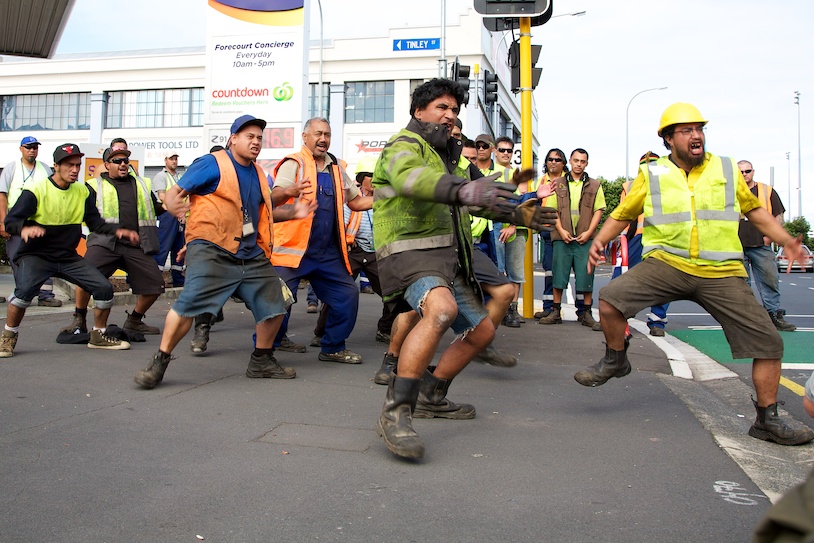The Ports of Auckland company (POAL) is wholly owned by Auckland Council, run by Labour Party member Mayor Len Brown and Labour-led City Vision ticket councilors. In base treachery these council leaders have been overseeing an attempted re-run of the 1951 defeat of the Auckland wharfies.
Labour Party leader David Shearer first struck a pose of neutrality, but the tide of sympathy for the wharfies forced him pretend support by speaking at their 10 March rally. The POAL board’s embarrassing dirty tactics, including the leaking of an employee’s personal details to be used by a rightwing blogsite, have given Len Brown and the council ample reasons to sack the port board, but so far (mid April) they have failed to act. The Labour Party’s rhetorical support for the wharfies will be utterly hollow unless they expel Brown and find another mayoral candidate for the next elections.
Background to the dispute
Workers at POAL have been employed through a collective agreement, negotiated on their behalf by the Maritime Union (MUNZ). Their collective agreement expired last September. There was a lot of flexibility built into the old collective agreement. It allowed for up to 25% of the workforce to be casual employees, who are not guaranteed any work, are employed shift-by-shift and can only rely on a guaranteed 8 hours minimum if they are called in. The agreement allows for a further 27% of the workforces to be employed as “P24s” – permanent workers who are guaranteed at least 24 hours per week (3 x 8 hour shifts). The remaining 53% of the workforce are full-time permanent employees, entitled to 40 hours per week over 7 days. They are able to stipulate one preferred day off per week, otherwise they must work any day, at any time of day.
The flexibility has ensured that POAL has operated at a high intensity of workforce exploitation that returned a healthy rate of profit, but Auckland Council demanded that profits be doubled. In any rational society New Zealand’s ports would work together harmoniously, but under the free market model the port companies are set up to compete against each other in a scramble for profit. Worker exploitation is even greater at Tauranga, the country’s next largest port, where work is contracted out to stevedoring companiesand and the workforce is much more casualised. The Tauranga model is what the POAL board want to implement and they caused the dispute by trying to ram casualisation through in collective contract negotiations.
The state of play at mid April
At the time this article was being penned the dispute at POAL was ongoing and its eventual outcome far from clear. The POAL board had been demanding nothing less than the capitulation of MUNZ to casualisation. The board rejected concession after concession offered by MUNZ to make the expiring agreement even more flexible. The board had not achieved their aims thanks to the steadfastness of MUNZ’s 297 POAL members, who by taking strike action since 24 February saw off the immediate threat of mass sackings. In their arrogance the POAL board had blatantly flouted the Employment Relations Act. On 27 March MUNZ won a temporary injunction at the Employment Court to stop POAL making redundancies and contracting out illegally, and from 5 April the wharfies were back at work but under extremely provocative employer behaviour: i.e. security guards rife in the workplace, including in the canteens where workers are supposed to be on a break; banning of union signage; cameras installed in crane cabs and canteens. Talks with POAL had resumed but the company were maintaining a hard line. On 12 April a Maritime Union (MUNZ) statement said:
Members of the Maritime Union were frustrated today that in mediation the Ports of Auckland has tabled a document that presses ahead with reductions to job security for wharfies. Maritime Union president Garry Parsloe said that company proposals not only reduce employee protections in the event of contracting out, but also continue to insist on the removal of employment security that would result in wharfies having no guaranteed days off, no protection against casualisation and a package that would significantly reduce their pay.
After two days of fruitless talks both parties agreed to go to “facilitation”.
Questions for the union movement
The conduct of the dispute so far and the prospects for MUNZ’s ultimate success has put the spotlight on a number of important issues for the union movement. Not least of these is the placing of any reliance on the law. MUNZ’s recourse to the law, the line pushed by the Council of Trade Unions, may prove to be a double-edged sword. The union won a legal argument that knocked the POAL board back and exposed its internal divisions, as shown by the resignation of board member Rob Campbell. Whether the board, and their political masters, have been sufficiently chastened for them to back off from casualisation in exchange for some face saving concessions by the union remains to be seen.
The downside of the legal entanglement has resulted in the union also losing momentum by calling off the industrial action and, after a lockout, the return to work taking the economic pressure off the port. If the POAL board do not back down and instead resume their drive to casualise the workforce, this time legally, MUNZ will be back at square one with their backs against the wall, having to restart an industrial action campaign all over again.
Although MUNZ has been able to use the Employment Relations Act (ERA) to restrain the port company from mass sackings during contract negotiations, the law generally and the judiciary are not neutral but are strongly biased against workers. The same ERA, disgracefully brought in by Helen Clark’s Labour government, is one of the most draconian in the world in preventing workers from exercising their right to take industrial action. Strikes can only take place legally within strictly limited bounds. Crucially, solidarity industrial action is outlawed.
The capitalist class fears nothing more than the workers’ ace card of solidarity. It is precisely in the shipping and port working industries where workers have most strongly established the traditions of solidarity action. The legal ban, which also exists in Australia, strikes at the heart of the New Zealand port workers’ abilities to defend themselves from casualisation and contracting out.
Despite admirable sporadic acts of unofficial solidarity action around New Zealand ports, and by Maritime Union of Australia members in Sydney, MUNZ has not been prepared to defy an unjust and anti-working class law by calling for official solidarity strikes in New Zealand and the international blacklisting of ships worked by scab labour at Auckland.
Nobody can say that for MUNZ to confront the law by calling solidarity action would be easy. It would mean breaking with the CTU’s subservience to the ‘rule of law’. It would mean readiness to defy the Employment Court and to expose the union to legal action. But if POAL management were to resume their nefarious plans the union would risk allowing casualisation to succeed if it denied itself the calling of effective solidarity action.
By the same law-abiding token a weakness of the wharfies’ action in the dispute so far has been to “picket” (i.e. not really picket) on roadsides to solicit the toots of motorists as tokens of the public support that they undoubtedly enjoy. Tokens of public support, such as online petitions, do not weigh in the balance in the same way as effective mass pickets. History shows that picket lines that achieve the shutdown of business, i.e. lines not crossed by delivery transport or scab labour, are the tactics that win disputes. If the port company forces the issue of casualisation, and appeals to the politicians are prove fruitless, the winning of the dispute may depend on the union’s willingness to use militant tactics, regardless of the anti-worker laws. There is a question mark over the Maritime Union’s commitment to traditional union tactics, given that it has shown a willingness to concede further on casualisation during talks rather than stand firm. If the need to restart industrial action arises MUNZ should call on the working class community to join their Auckland picket line and send flying pickets to spread the action to other ports.
At the 10 March rally in Auckland some 4-5000 trade unionists turned out to support the wharfies. The rally was a form of solidarity action that was effective in so far as it was a morale boost to the wharfies and put pressure on Auckland Council. Given the political dimension to the dispute applying pressure on the council is a rightful thing to do. MUNZ’s slogans were aimed in this direction. But a strategy that puts hopes only on a political solution, legal action and compromise negotiations is risky. MUNZ’s real muscle lies in spreading the dispute beyond Auckland.
Some of the speeches at the rally shed light on the problems of the union movement of today. Pledges of support by International Transport Workers’ Federation affiliated union leaders from Australia and the USA were pledges of financial support. The really effective dispute-winning action that the situation demanded was solidarity industrial action that puts the squeeze on the shipping industry. This is not a matter of altruism by other port workers. The more that port employers in any one country get away with casualisation, the greater becomes the opportunity for the ports in other countries to follow suit. As the casualisation dominoes fall the potential for the international solidarity action, which has served to defend port workers so well before, becomes diminished. In an international industry it really is the case of ‘United we stand, divided we fall’.
Another issue highlighted by the dispute is the effects of a divided workforce. For whatever the historical reasons, MUNZ’s strength at POAL is weakened by the divisions between full-time, part-time and casual workers. Thus a proportion of the workforce is non-union and worked during the strikes. MUNZ’s offers of further concessions in the direction of even more flexibility can only store up problems of disunity for the future. No doubt MUNZ negotiators consider that they have no choice but to try and salvage what they can of the expiring agreement. It comes back to the question of solidarity and what makes for truly effective industrial action. If the boot was on the union’s foot MUNZ could go on the offensive and demand that casuals are made permanent and part-timers given the option of full-time contracts.
Subjecting MUNZ to the searching questions raised above is necessary. The attack on the wharfies is a life and death test that demands that the union is up to the task. For all the weaknesses of MUNZ’s situation, the strike action taken by the Auckland wharfies to thwart the employer offensive so far has been an inspiration to the wider union movement. In truth, the 10 March rally for the wharfies probably did more good for building fighting spirit in the supporting unions that it did for MUNZ. MUNZ members have shown that fight backs against the most vicious employer attacks are possible. To turn round the tide of the neo-liberal assault on the working class that has gone on for 30 years, to go from the habits of defeat to the prospects of victories and socialism, we need to rebuild the fading union traditions of solidarity. A clear-cut victory for the wharfies will help that process immeasurably.









